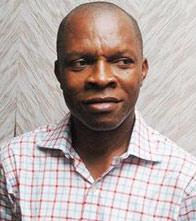Struggling on all fronts, by Patrick Omorodion

World acclaimed Jamaican reggae crooner had a song ‘Struggling Man’.
Part of the lyrics of the song went thus: As the sun lights the day and the moon lights the night, Struggling man keeps reaching for the higher heights. So we plan for tomorrow as we live for today. Like a flower we bloom and then later fade away.
This is exactly what my dear country, Nigeria has turned into. A struggling country, and like Jimmy Cliff sang, Nigeria has become like a flower which blooms but later fades. And fast too I add.
By every standard, Nigeria is not supposed to be a poor country. In fact, based on our natural resources, the country is not supposed to be behind any country in Africa.
Wastages caused by poor management of these resources have, however, put us behind Egypt but luckily among the top five richest ranked by Gross Domestic Product (GDP) in 2025. Behind Nigeria in descending order are South Africa, Algeria, and Ethiopia.
Recently, CAF released the list of approved venues for the 2025/2026 inter club competitions, the Champions League and the Confederation Cup.
Shockingly Nigeria had only two of her over 50 stadia scattered around the country approved for these competitions, including of course the 2026 FIFA World Cup qualifiers which resumes this week.
The two are the Moshood Abiola National Stadium in Abuja and the Akwa Ibom state owned Godswill Akpabio stadium in Uyo.
Our flagbearers for the inter club competitions, Remo Stars of Ikenne and Rivers United in the Champions League and Abia Warriors and Kwara United in the Confederation Cup may not be playing at their traditional grounds because they didn’t pass CAF test for standard venues.
We don’t lack money to build stadiums, what we lack is the maintenance culture to keep them in good condition always.
Isn’t it a shame that South Africa which is behind Nigeria by GDP have 13 venues approved for it while Morocco which is not even among the continent’s top five have 10 stadiums approved for it?
In fact the Maghreb country has become the bride of both CAF and FIFA which take competitions there without blinking, be- cause it has fantastic infrastructure.
It must however, be stated that the quality or state of stadiums is not the only criteria for hosting FIFA competitions. But they are very crucial.
Another country under Nigeria by GDP ranking, Algeria have nine approved stadiums for CAF competitions.
Cote d’Ivoire have six approved, Cameroon, Mali and Egypt have five each while DR Congo, Tunisia, Uganda and Equatorial Guinea are ahead of Nigeria with three each.
Nigeria, ranked 12th, leads the countries with only two approved stadiums which includes Ethiopia, Libya, Senegal, Rwanda, Zambia, Tanzania, Ghana, Kenya and Zanzibar.
It is shocking that stadiums such as the Enyimba International stadium in Aba, Dan Anyiam stadium in Owerri, Teslim Balogun stadium and Mobolaji Johnson Arena, formerly Onikan stadium both in Lagos which have hosted international matches in the past couldn’t pass CAF’s test.
Other stadiums which have had a taste of either CAF or FIFA approved matches but are now in the cooler are Ahmadu Bello Stadium, Kaduna, Liberation stadium and Adokiye Amiesimaka stadium, both in Port Harcourt, Sani Abacha stadium in Kano, Samuel Ogbemudia stadium in Benin City, Stephen Keshi stadium in Asaba, Obafemi Awolowo stadium, formerly Liberty stadium in Ibadan, U. J. Esuene. stadium in Calabar and the one in Abeokuta rechristened MKO Abiola Sports Arena.
Nigeria has four tiers of football leagues, namely the elite Nigeria Professional Football League, NPFL, Nigeria National League, NNL and the Nationwide League, Divisions One and Two.
While 20 teams play in the NPFL, 46 play in the NNL, 91 play in Nationwide Division One and 52 play in the Nationwide Division Two.This is not forgetting that numerous other clubs play in their various state leagues across the country.
The lack of standard playing surfaces in our various leagues could be linked to the poor play exhibited by players when they go for international competitions outside as recently exhibited by the CHAN Eagles at the 2024 competition which ended in Nairobi, Kenya yesterday.
No wonder none of them was picked to join the final Super Eagles squad for this weekend’s match against Rwanda in Uyo and against Bafana Bafana on Tuesday in Bloemfontein.
While Nigeria struggles to keep her economy healthy, it struggles to build standard stadiums and struggles to maintain them. The football authorities struggle to run the leagues as professional as it should be while the football clubs also struggle to keep the sprinkle of good players who always run abroad seeking better remuneration.
As you read this, the Super Eagles players who have a very tall mountain to climb will soon start arriving for the crucial 2026 World Cup qualifiers, first at home against Rwanda who are surprisingly ahead of Nigeria with eight points.
After that, they will jet out to South Africa who lead the group with 13 points, six more than Nigeria’s. If the result is anything but a win against Rwanda, the away match against Bafana Bafana will just be a mere formality.
A win against Rwanda and a draw against South Africa could prove a rejuvenating tonic for a miracle as the sword of Damocles is still dangling on their neck following the use of an ineligible player against Lesotho that may lead to them losing three vital points.
The struggling for the Super Eagles will continue until all hopes are restored or finally lost as their fate is no longer in their hands.
The post Struggling on all fronts, by Patrick Omorodion appeared first on Vanguard News.







